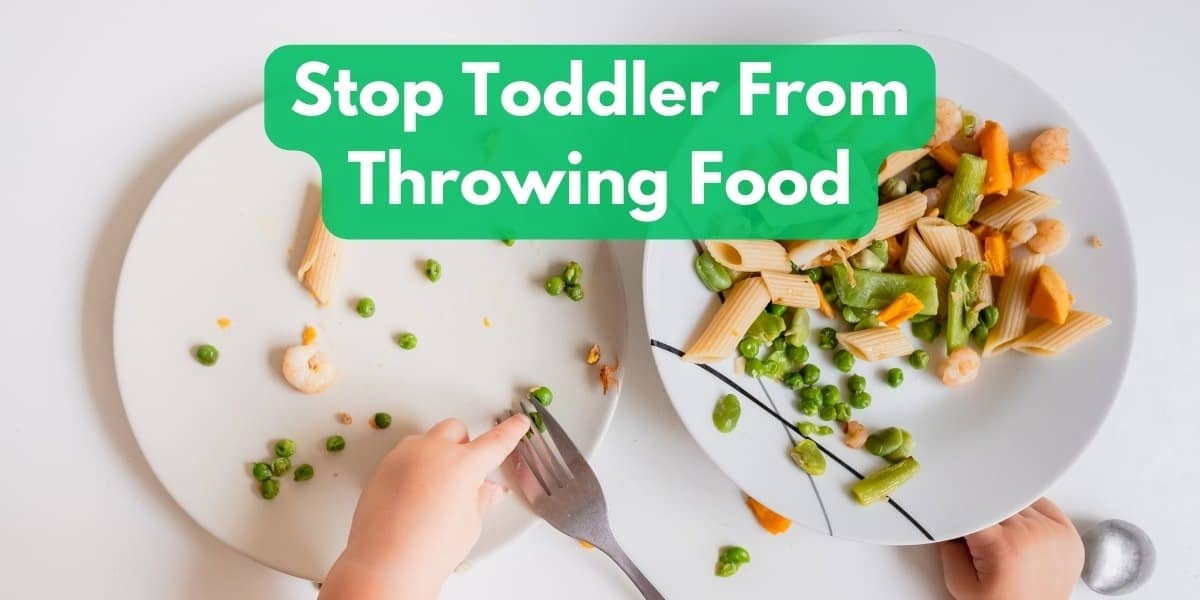Are mealtimes with how to stop toddler from throwing food? Don’t worry, we’ve got you covered! In this article, we’ll provide you with practical tips and strategies to help you stop your little one from tossing their food across the room.
From understanding the reasons behind this behavior to implementing effective techniques, you’ll learn how to create a peaceful and enjoyable dining experience for the whole family. So grab a seat and let’s put an end to food throwing once and for all!
Understand the Reason
Explore the cause of the behavior
As a parent or caregiver, it’s important to understand why your toddler is throwing food. Toddlers often engage in behaviors like throwing food as a way to express their independence or communicate their needs. By taking the time to explore the cause of the behavior, you can gain insight into what may be triggering your toddler’s actions.
Consider hunger or boredom
One possible cause of food-throwing behavior is hunger or boredom. If your toddler is hungry, they may become frustrated and toss their food as a way of expressing their hunger. Similarly, if they are bored with their meal, they may resort to throwing food as a form of entertainment. Being aware of your toddler’s hunger level and ensuring that their meals are engaging can help alleviate this issue.
Observe for patterns
By observing your toddler’s behavior during mealtimes, you may begin to notice certain patterns that can provide clues as to why they are throwing food. Are they throwing food when they are done eating? Are they throwing specific types of food? Understanding these patterns can help you pinpoint the cause of the behavior and make necessary adjustments to prevent food-throwing incidents in the future.
Create a Positive Mealtime Environment
Set a calm and pleasant atmosphere
Creating a calm and pleasant atmosphere during mealtimes can help discourage food-throwing behavior. Avoid chaotic or tense situations, and instead, create a nurturing environment where your toddler feels comfortable and relaxed. Play soft music, dim the lights, and engage in light conversation to establish a pleasant dining experience.
Establish a routine
Having a consistent mealtime routine can provide your toddler with a sense of structure and predictability. Set regular mealtime schedules and stick to them as much as possible. This routine can help your toddler understand that mealtimes are a regular part of their day and reduce the likelihood of food-throwing behavior.
Ensure a comfortable seating arrangement
A comfortable seating arrangement is essential for promoting positive mealtime behavior. Make sure your toddler has a comfortable high chair or booster seat with appropriate support. Ensure that their feet are properly resting on a stable surface to give them a sense of security during meals.
Eliminate distractions
Minimize distractions during mealtimes to help your toddler focus on eating rather than engaging in food-throwing behavior. Turn off the television, remove toys or electronic devices from the dining area, and create a dedicated space for eating. Eliminating distractions can encourage your toddler to engage in the mealtime experience fully.
Model Appropriate Behavior
Be a good role model
Your toddler looks up to you as their role model, so it’s essential to exhibit appropriate behavior during mealtimes. Sit with good posture, use utensils and napkins properly, and demonstrate good table manners. When your toddler sees you behaving appropriately, they are more likely to follow suit and exhibit positive mealtime behavior as well.
Show proper eating habits
Demonstrate proper eating habits by taking small bites, chewing with your mouth closed, and savoring your food. Making positive comments about the taste and texture of your meal can also encourage your toddler to approach their food with enthusiasm. Modeling appropriate eating habits can help your toddler develop a healthy relationship with food.
Express enjoyment of food
Expressing enjoyment of food is crucial in shaping your toddler’s attitudes towards eating. Take the time to savor your meals and express excitement when trying new foods. Show enthusiasm for the flavors and textures of the food you are eating. Your toddler will pick up on your positive cues and be more inclined to approach their meals with a similar mentality.
Also Check: How To Keep Toddlers In Room At Night?
Involve Your Toddler in Meal Preparation
Include them in meal planning
Including your toddler in the meal planning process can increase their engagement and sense of ownership over their food. Give them choices within healthy options and ask for their preferences. This involvement can help reduce the likelihood of food-throwing behavior during meals.
Let them participate in cooking
Allow your toddler to participate in age-appropriate cooking tasks to get them excited about mealtimes. Simple tasks like stirring, pouring ingredients, or helping to assemble simple dishes can make them feel involved and eager to eat the fruits of their labor. This involvement can foster a positive relationship with food and reduce the desire to throw it.
Engage them in setting the table
Engaging your toddler in setting the table can promote a sense of responsibility and involvement in the mealtime process. Let them help with simple tasks like placing utensils, napkins, or cups on the table. This involvement can create a positive mealtime atmosphere and discourage food-throwing behavior.
Offer a Variety of Food Choices
Present a range of nutritious options
Offering a variety of nutritious food choices can help satisfy your toddler’s taste and texture preferences, reducing the likelihood of food-throwing behavior. Provide a balanced array of fruits, vegetables, proteins, and whole grains. Experiment with different flavors and colors to make mealtime exciting and enticing for your toddler.
Give them control within limits
Allowing your toddler to have some control over their food choices can help prevent power struggles and promote a positive mealtime experience. Offer them limited options to choose from, such as selecting between two side dishes or deciding between different types of fruits. This sense of autonomy can reduce frustration and potential food-throwing incidents.
Encourage self-feeding
Encouraging self-feeding can empower your toddler and make mealtimes more enjoyable for both of you. Provide age-appropriate utensils and dishes that are easy for them to handle. Allow them to explore different textures and practice self-feeding skills. The independence provided by self-feeding can reduce the desire to throw food.

Establish Clear Boundaries
Set rules and expectations
Establishing clear rules and expectations can help your toddler understand what is acceptable behavior during mealtimes. Communicate these rules in a firm but gentle manner, and consistently reinforce them. Clear boundaries can provide structure and reduce the likelihood of food-throwing incidents.
Be consistent in enforcing boundaries
Consistency is crucial when it comes to enforcing boundaries during mealtimes. Your toddler needs to know that the rules are consistently applied. If they are allowed to throw food one day but not the next, they may become confused and continue the behavior. Consistency will help your toddler understand that food-throwing is not acceptable.
Use positive reinforcement and praise
Positive reinforcement and praise can be effective tools in encouraging desirable mealtime behavior in your toddler. When they exhibit appropriate behavior such as using utensils or trying new foods, provide praise and encouragement. This positive feedback can reinforce their good behavior and motivate them to continue behaving positively during meals.
Address Any Potential Sensory Issues
Check for sensory sensitivities
Some toddlers may have sensory sensitivities that contribute to food-throwing behavior. They may find certain textures, flavors, or smells overwhelming, leading them to reject or throw their food. Pay attention to any signs of sensory sensitivity and make note of foods that trigger these reactions.
Modify textures or presentation if needed
If you suspect that sensory issues may be contributing to food-throwing behavior, consider modifying the textures or presentation of certain foods. Experiment with different cooking techniques, textures, or ways of presenting food to make it more appealing to your toddler. Gradually introduce new textures to help them become more comfortable with different foods.
Consider consulting a healthcare professional
If you have concerns about your toddler’s sensory issues or if their food-throwing behavior persists despite your efforts, consider consulting a healthcare professional. They can provide guidance and support specific to your toddler’s needs and help address any underlying sensory issues that may be contributing to their behavior.
Implement Consequences
Apply logical consequences
Implementing logical consequences can help teach your toddler about cause and effect while discouraging food-throwing behavior. For example, if they throw their food, calmly explain that if they continue, the meal will end. If they persist, follow through with ending the meal. This helps them understand that throwing food has consequences and may lead to hunger.
Remove the food if throwing occurs
If your toddler throws their food, promptly remove it from their reach. This eliminates the opportunity for them to continue engaging in the behavior. Explain to them that throwing food is not acceptable and that they will not be able to eat until the next meal. Consistently implementing this consequence can help deter food-throwing behavior.
Introduce time-out if necessary
In some cases, introducing a time-out may be necessary if your toddler continues to throw food despite other consequences. Use a designated area or chair for time-outs and calmly explain that their behavior is unacceptable. Keep time-outs brief and age-appropriate, typically around one minute per year of age. Time-outs can help your toddler understand that their actions have consequences.

Source: TheTechBrain AI
Teach Alternative Ways to Communicate
Encourage the use of words or gestures
Encouraging your toddler to use words or gestures to express their needs and desires can help reduce frustration and minimize the desire to throw food. Teach them simple words or signs for basic requests such as “more,” “done,” or “water.” This alternative form of communication can give them a way to express themselves without resorting to food-throwing.
Teach basic sign language
Introducing basic sign language can be a useful tool in promoting effective communication during mealtimes. Teach your toddler signs for common food-related words, such as “eat,” “drink,” or “all done.” This can provide them with an additional means of expressing their needs and reduce the likelihood of food-throwing behavior.
Provide alternative means of expression
In addition to words and signs, provide your toddler with other ways to express themselves during meals. Offer them a choice board with pictures of different foods or activities, allowing them to point to their preferences. Providing alternative means of expression can empower your toddler and reduce the frustration that may lead to food-throwing.
Conclusion
Consistency is key when addressing food-throwing behavior in toddlers. By consistently following the strategies outlined in this article, you can effectively discourage food-throwing and establish positive mealtime behavior. It’s important to remember that every child is unique and may respond differently to these strategies. What works for one child may not work for another.
Be patient and willing to adapt your approach to suit your toddler’s individual needs.With time, consistency, and a friendly approach, you can help your toddler overcome food-throwing behavior and establish healthy mealtime habits.

